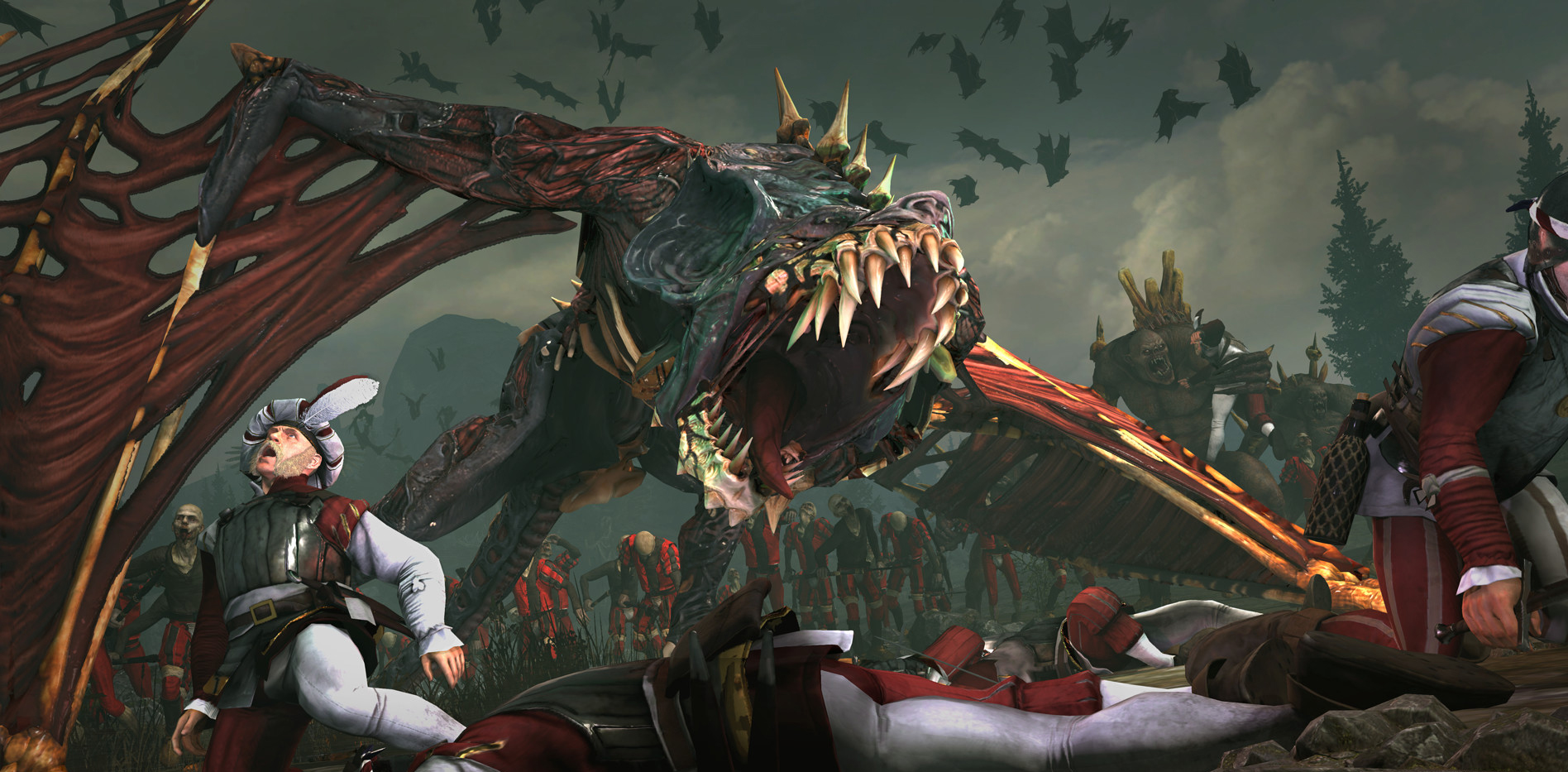Our Verdict
If you find real history a bit bland compared to glorious nonsense made up by strange British people then Warhammer is the Total War for you.
PC Gamer's got your back
What is it? The Total War series' big, real-time strategy battles themed after the Warhammer universe.
Price: $60 / £40
Release Date: May 24, 2016
Publisher: Sega
Developer: Creative Assembly
Multiplayer: Up to 8 players, online and local
Link: Official site
Dwarfs line the walls of the Everpeak, weapons ready. They fire bolt and lead at the incoming Orcs, but to the Giant lummoxing forward at the head of the green horde it may as well be a light smither of rain. The Giant crashes into the gates, stumbles back and crashes into them again. It bursts through to be faced by massed units of Longbeards, fearless Dwarf veterans, who mob the Giant like dogs harassing an elephant.
They win, because in the rock, paper, scissors of Total War: Warhammer the Longbeards' immunity to psychological effects makes them good at fighting fear-causing Giants. Slayers would be even better as they have the Anti-Large trait as well as Unbreakable, but this is a game where paper can beat scissors so long as there's enough of it.
Moldy Old World
Until now Total War has recreated historical eras, and so the tactics have been based on simplified versions of real-world tactics, whether deployed by Rome or Napoleon. Cavalry flank and race ahead to attack missile units before they get too many shots off; spears defend and resist cavalry charges; missile units pour volleys into dense infantry units as they slowly advance. Here, things are more complicated.
The Warhammer World is a fantasy setting, one loosely based on Renaissance Europe but with the fiction of J. R. R. Tolkien, Michael Moorcock, H. P. Lovecraft and Fritz Leiber funnelled into it through industrial pipes while copies of 2000 AD and heavy metal album covers are scattered on top. It's a mish-mash of everything someone at Games Workshop ever thought was cool, and it's both familiar and really weird.
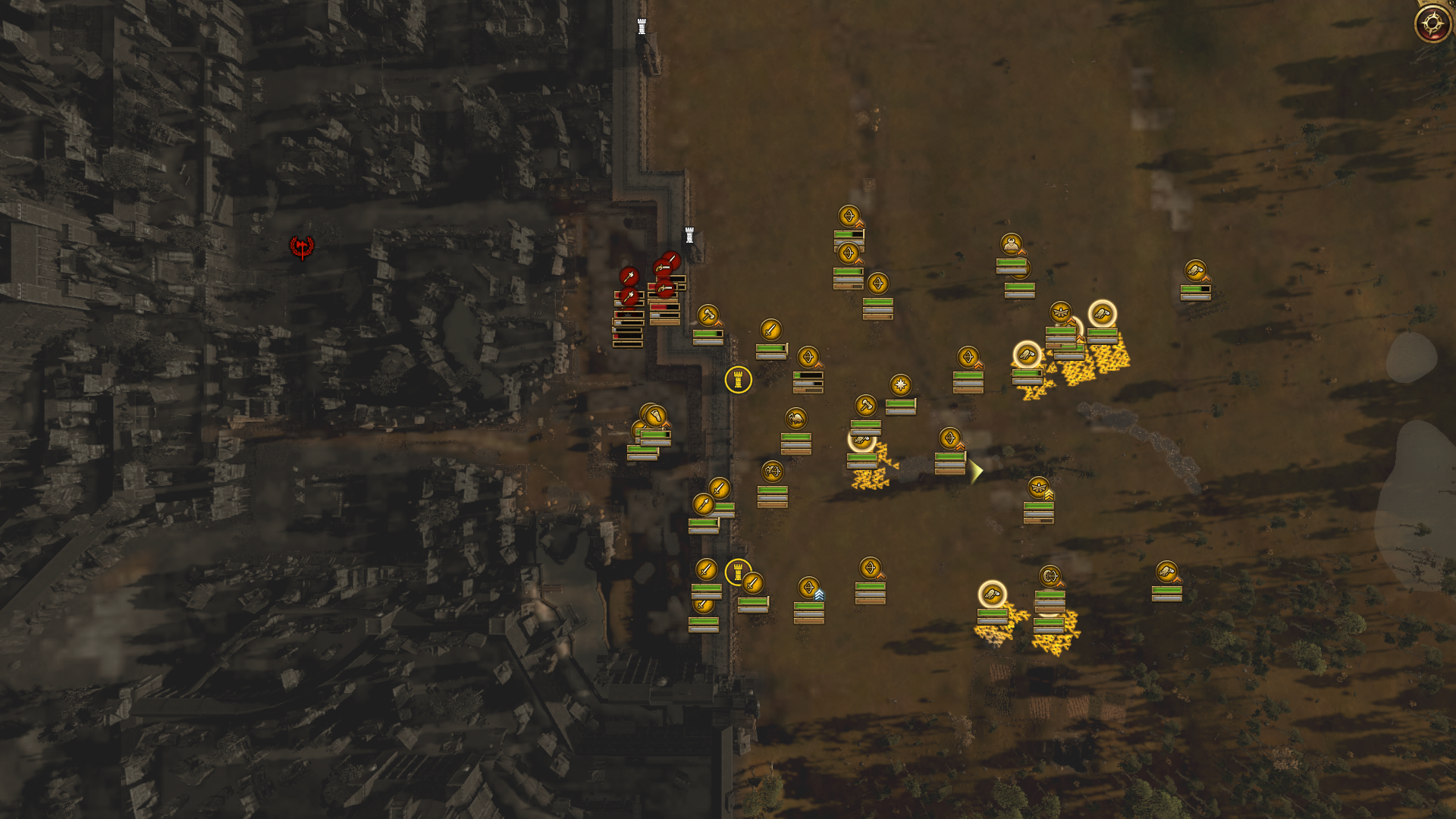
There's plenty of crossover between fans of historical wargames and Warhammer, as shown by two of the previous Total War games receiving fan-made mods that squeeze Warhammer armies into them. This is something else though, a ground-up alteration of the Total War formula to make it suit the fantasy setting of the Old World (and it's moddable too, so someone out there must be itching to reverse the trend and put historical armies back in). That formula comes in two halves. The first is a turn-based grand campaign about marching armies across a map and managing provinces through construction, research, and taxation, trying to balance the economy and people's happiness with army-building. The second happens when those armies meet and drop into a real-time, though pausable, battle.
In previous Total War games the factions played in a relatively similar way, but not any more. For instance, the Greenskins have a meter measuring each army's Fightiness. Win battles, and it rises. Lose, or squat in your hovels like a coward, and it drops. If Fightiness is high enough, and there are at least 17 out of a maximum 20 units in the stack, all that sweet victory encourages other Orcs to band together in a bonus force called a Waaagh! For other species buying and maintaining multiple armies is a huge expense, but for Greenskins can earn them free, which encourages a state of constant aggression that's entirely appropriate.
Dwarves never forget a slight, carefully noting each in a massive book of bitterness.
Dwarfs on the other hand have to keep track of grudges. They never forget a slight, carefully noting each in a massive book of bitterness. Any time their land is raided or attacked or Dwarfs are hindered in any way some scholar back at the capital sucks in air over his teeth and says, “That's going in the book.” While revenge earns rewards, having too many unavenged grudges drops public order as people lose faith in their leader. It breeds a playstyle all about defence, limiting fronts on which the Dwarfs can be attacked and only marching off to make new enemies when old ones have been thoroughly dealt with.
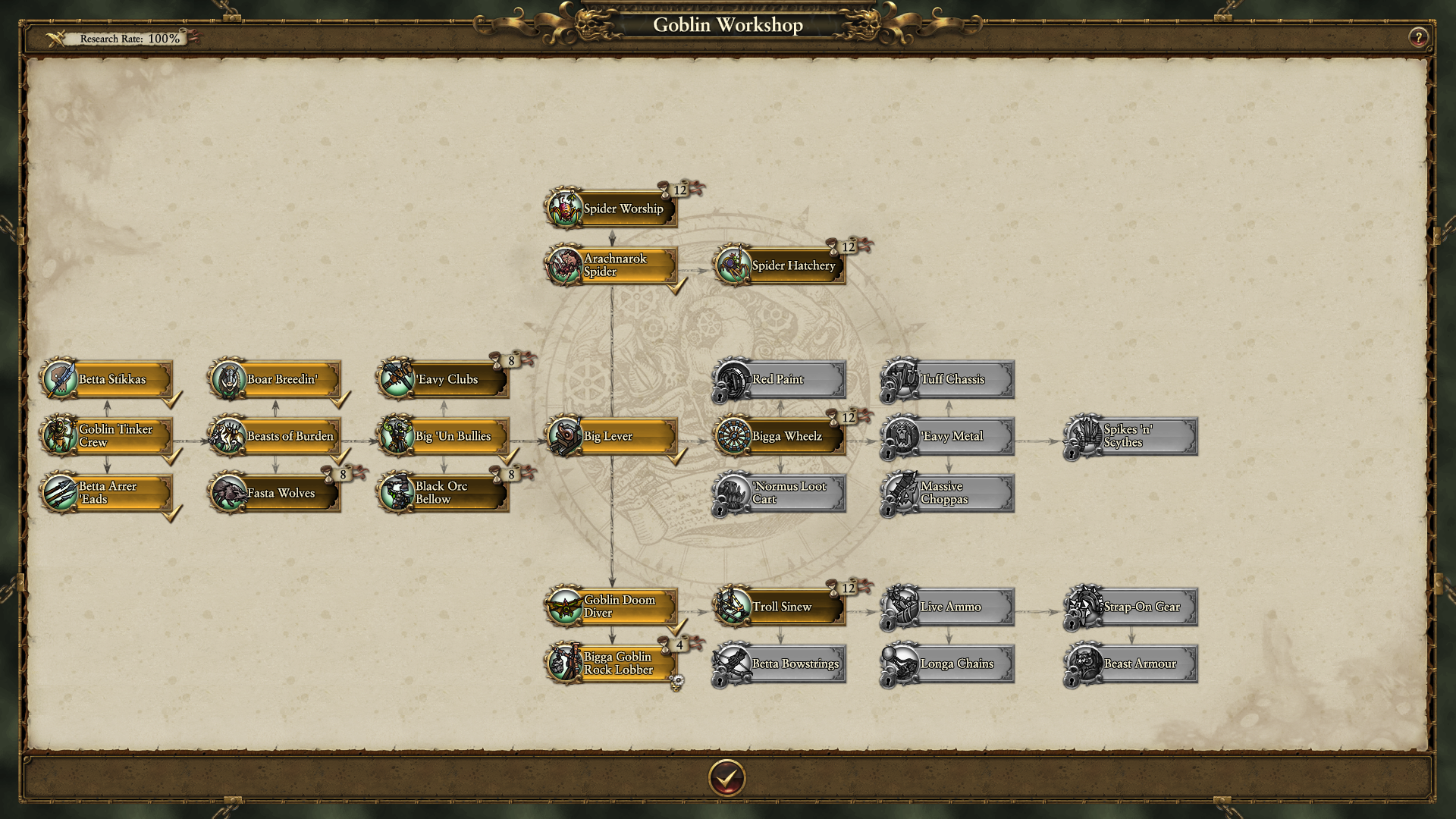
Meanwhile, the Vampire Counts rely on spreading corruption in the form of a grey, sickly taint on the map. Other factions suffer attrition when moving across corrupted land while Vampire Counts armies are diminished by marching across uncorrupted land. The Vampire Counts can also raise the dead to fill armies instantly rather than waiting (like in Rome II, armies are generated by generals rather than settlements, but cost extra away from the buildings that produce specialists). It's not as much of a game-changer as you'd expect. Unlike the Heroes Of Might & Magic games where the undead grow and grow as they incorporate the fallen into their hordes, Warhammer's Vampire Counts are still reliant on the old-fashioned way to get decent troops, though provinces where large battles have been fought provide a better class of corpses to recruit.
The final of the four playable factions (Bretonnians exist as NPCs but can be used in multiplayer, while Chaos Warriors are available free to those who pre-ordered or buy Total War: Warhammer in its first week and will be paid DLC later) is The Empire. Modelled on the Roman-German Empire, the humans are the most traditional faction, with starting units including crossbowmen, spearmen, and knights that will be more familiar to Total War players than Terrorgheists and Arachnaroks. Imperials get weirder as they go on, with Steam Tanks and knights who trade horses for eagle-headed Demigryphs while their leader Karl Franz can upgrade to a flying Griffon.
All these differences dramatically affected the way I played. As the Greenskins I fought just to keep armies Fighty and raided neighbors without regard for what they thought because that's a significant part of the Orc income even though it went against what I learned with other factions and my regular tendencies. It's not the kind of game where replaying as a different side means "focusing slightly more on missile weapons because they have +1 with bows". Each faction is almost a different game, and that's kept me interested.
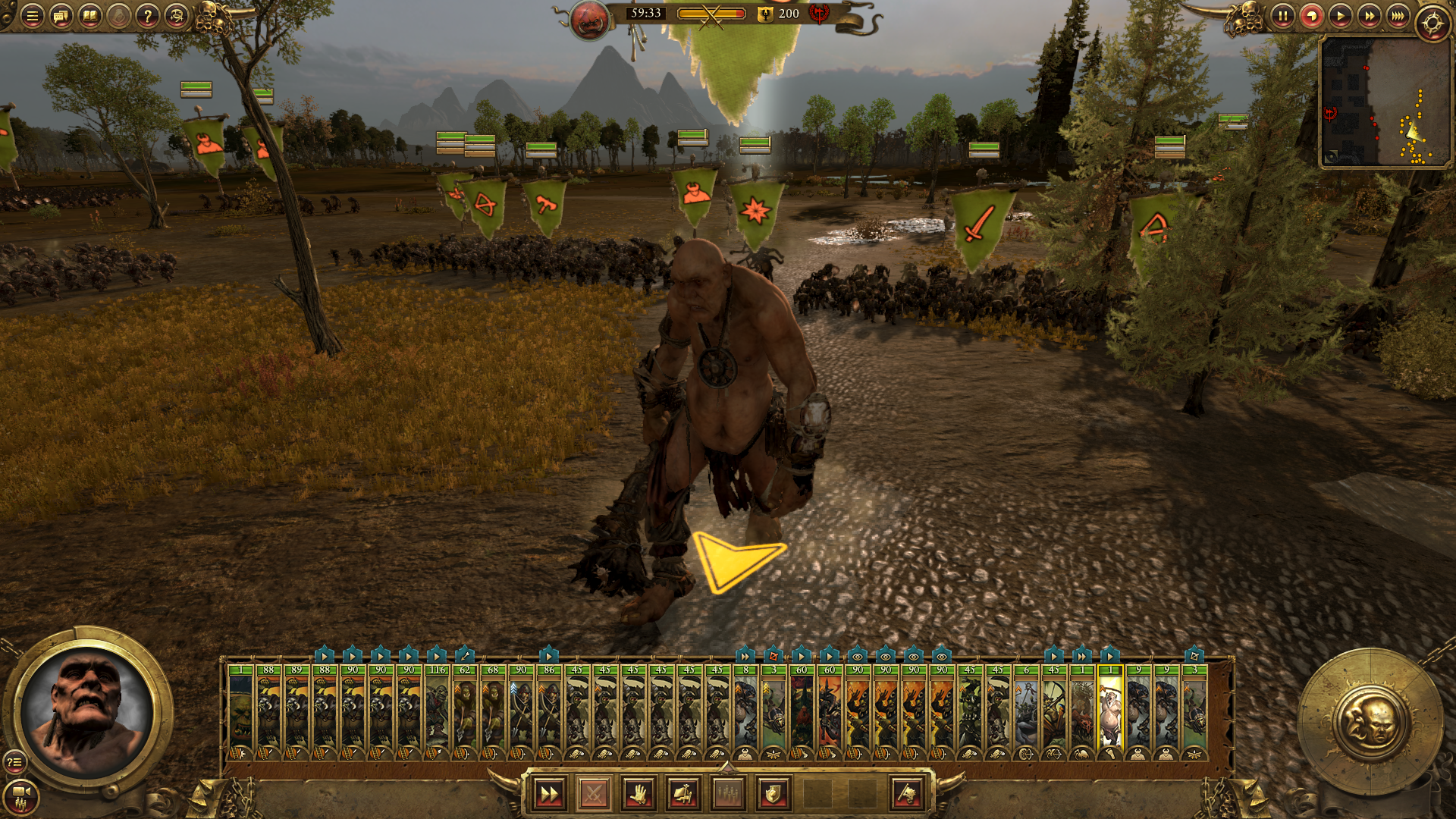
Fantasy battles
There's variance between factions in both the turn-based campaign game and the real-time battles. Dwarfs don't have wizards but are blessed with plenty of artillery, and are generally more of a defensive, come-get-me-you-lanky-bastards force. Vampire Counts don't have missile units (not even skeleton archers), though their wizards have a decent Wind Of Death spell. For them it's all about lurching forward, targeting specific enemies with flying units and Black Knights while the skeletons and zombies shamble up to fill the gaps. The Greenskins have a bit of everything, but can be hard to control. When their Leadership drops due to being flanked or attacked by enemies who cause fear they have a tendency to scarper, but recover quickly and need to be shepherded back into the fray for wave after wave.
The effect of spellcasting on battles is less than expected. There's a limited pool of Winds Of Magic to draw from, with goofy blue haze wafting over the campaign map to show where it's strongest this turn, and individual spell effects feel slight compared to the impact of a flanking manoeuvre or well-timed charge. The Raise Dead spell can summon a unit of zombies out of the ground, which is suggested by the handy in-game guide as a good way of blocking a charge, but also works to bog missile units down or pull off a flank attack. Zombies are weak combatants, however, and the spell can only be cast if you're at less than 20 units. Plus, even if those fragile zombies survive they'll be gone at the end of the battle.
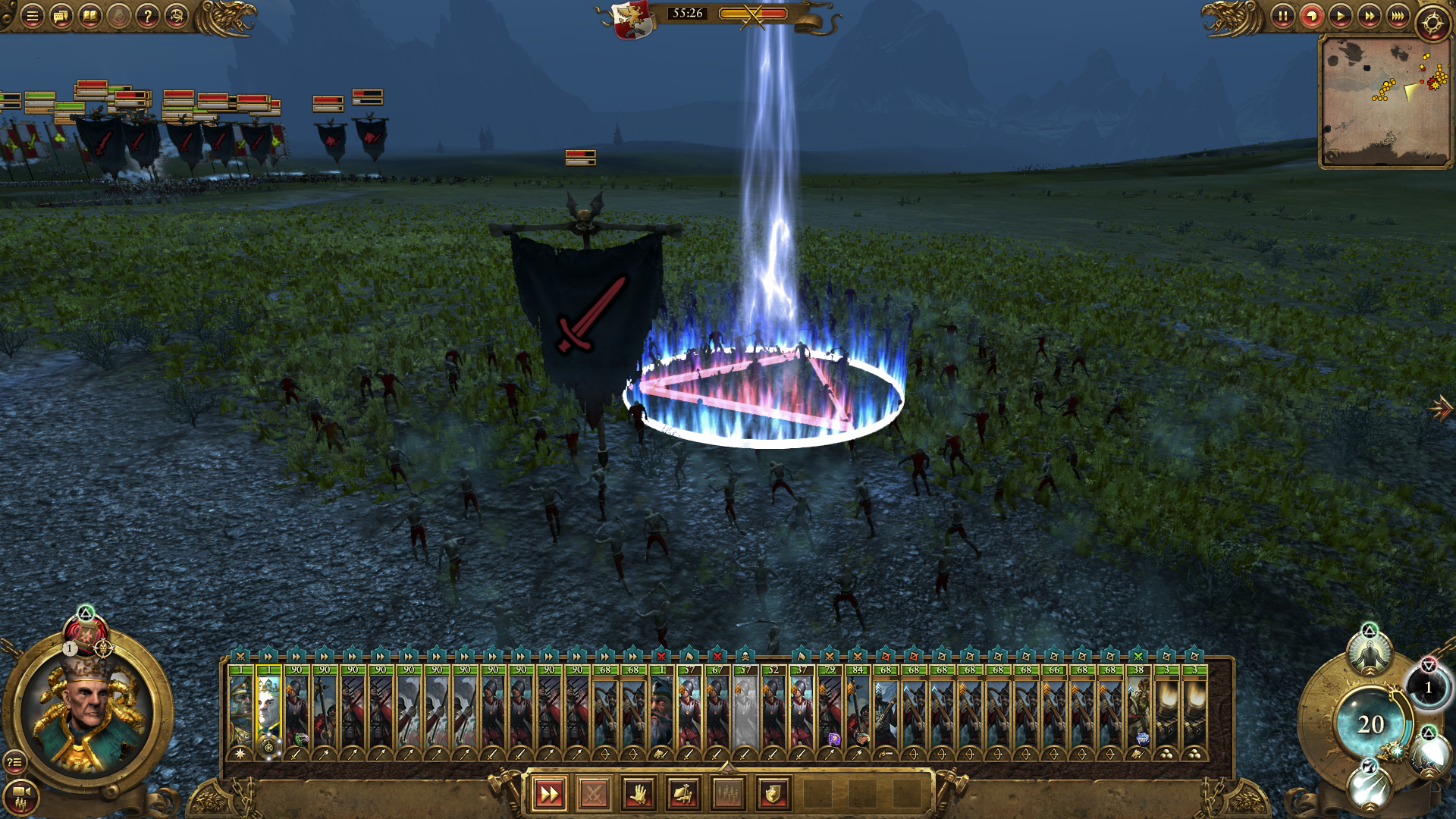
In the first trailer for Total War: Warhammer a single spell obliterated an undamaged Steam Tank, but things seem to have been toned down since then. That's for the best, as now spells are useful additions to the arsenal but won't win a battle on their own. It's something the tabletop game has struggled with in the past, with different editions of the rules swinging back and forth on how powerful magic should be, but I prefer it like this. One magical zap is no more effective than a volley of cannonfire.
Most of the other spells are variations on projectile attacks, buffs, or debuffs, with flavour text to differentiate them—Goblin Shamans can cause distracting itchiness, while Necromancers make enemy soldiers age by years. There are magic items for your Lords and Heroes too, and banners to your troops, most of which give percentage boosts to abilities. Those Lords and Heroes are powerful combatants, though. Unlike in previous Total War games where the general led from the back, close enough to provide benefits but not close enough to be slaughtered, in Warhammer they're some of your best fighters. Though their loss is devastating to morale, and undead armies can crumble after their general's death, I charge in anyway out of both necessity and a desire to watch their animations as they wreak havoc.
The temptation with Total War is always to zoom right in and watch fights up close, and that's even stronger when it's Dwarfs with mohawks taking axes to looming Trolls.
The temptation with Total War is always to zoom right in and watch fights up close, and that's even stronger when it's Dwarfs with mohawks taking axes to looming Trolls. But it's important to keep an eye on the overall battlefield to ensure reinforcements are being dealt with, flying units aren't hassling your artillery, and so on. Tabbing in and out of a tactical view that presents the battlefield from far above with units as neat rectangular banners helps, and when I zoom back in to see melee devolve into a mess, units overlapping and soldiers clipping through each other, I do feel a pang for the straight edges and ruler-perfect abstraction of turn-based tabletop Warhammer.
It's possible to pull off amazing things even in the morass, though it helps to abuse the slow-motion button and give orders while paused, as you can in single-player mode. You can overcome odds that the auto-resolve option for battles isn't able to: outnumbered 10 to 1 by two Greenskin stacks I still won a narrow victory as the Vampire Counts even though my Legendary Lord Mannfred Von Carstein fell. It's a great feeling to pull something like that off.
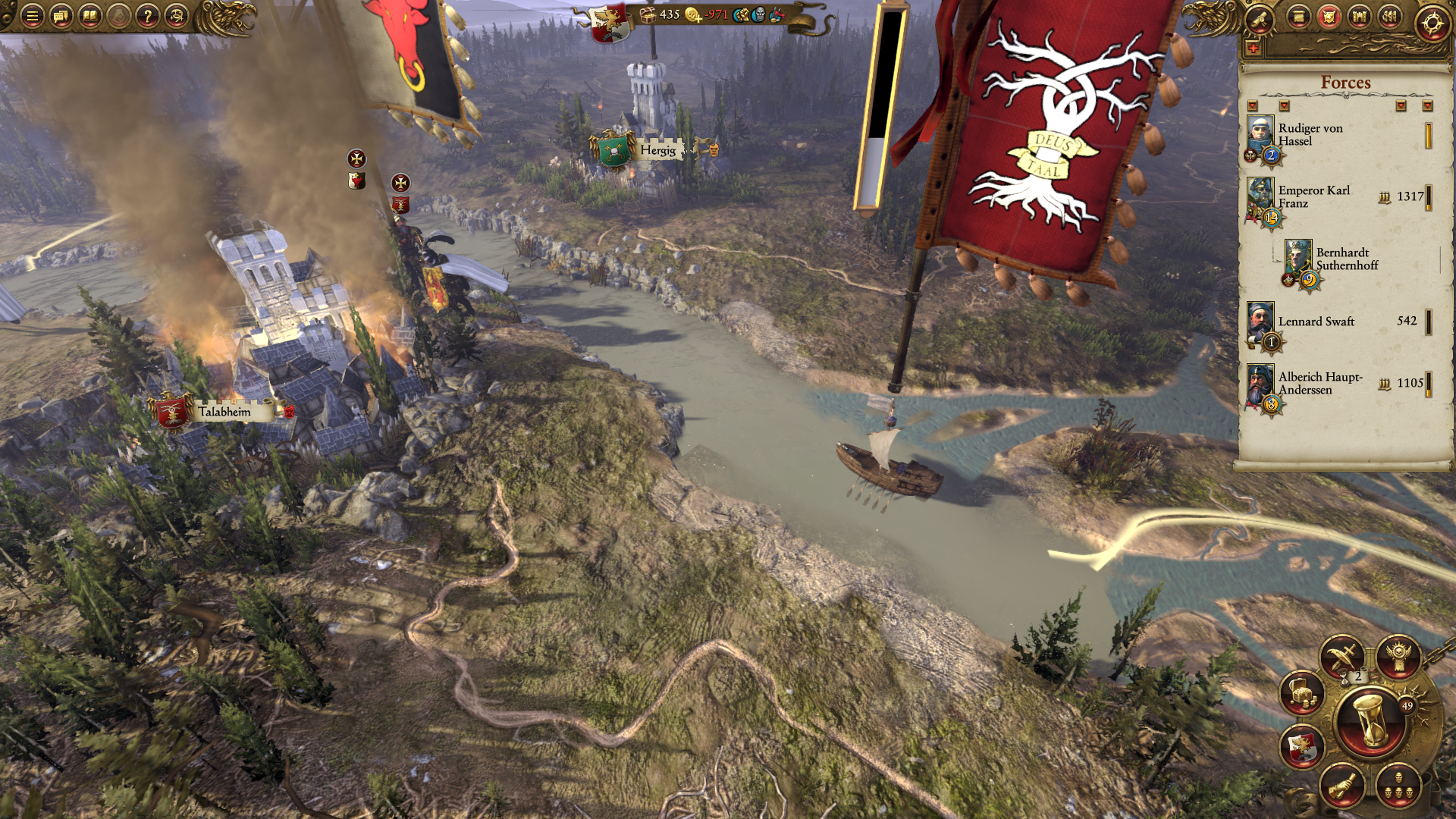
Lords and quests
At the start of a campaign you choose which of two Legendary Lords will lead your faction, iconic Warhammer characters like Emperor Karl Franz and High Wizard Balthasar Gelt, with the other character becoming available during the campaign. Each has their own questlines to pursue, storylines that unlock special battles to earn unique artifacts. These quest battles can also be played outside the campaign in a separate mode of their own. You might be facing an army with four Shamans, or reinforced by Dwarf Gyrocopters, and your Lord begins each battle with a rousing speech. (This is the only time you hear speeches–unlike Shogun 2 you won't have to skip them before every scrap.)
Because quests are bespoke little stories separate from the campaign—you use your regular army but opponents are conjured up on the spot rather than drawn from existing enemies—there's a risk of them seeming inconsequential. But their unique nature, and the few paragraphs of narrative that come with quests, are reward enough that I probably waste too much effort chasing them.
Though early quest destinations are near the starting positions, they quickly pop up much farther away. Sending your Lord off with an army strong enough to beat them is a bad idea, as even with another powerful stack of troops at home it leaves you open to a concentrated attack, like a sudden Waaagh! Unlocking quests often requires sending your Heroes off to perform specific actions, too.
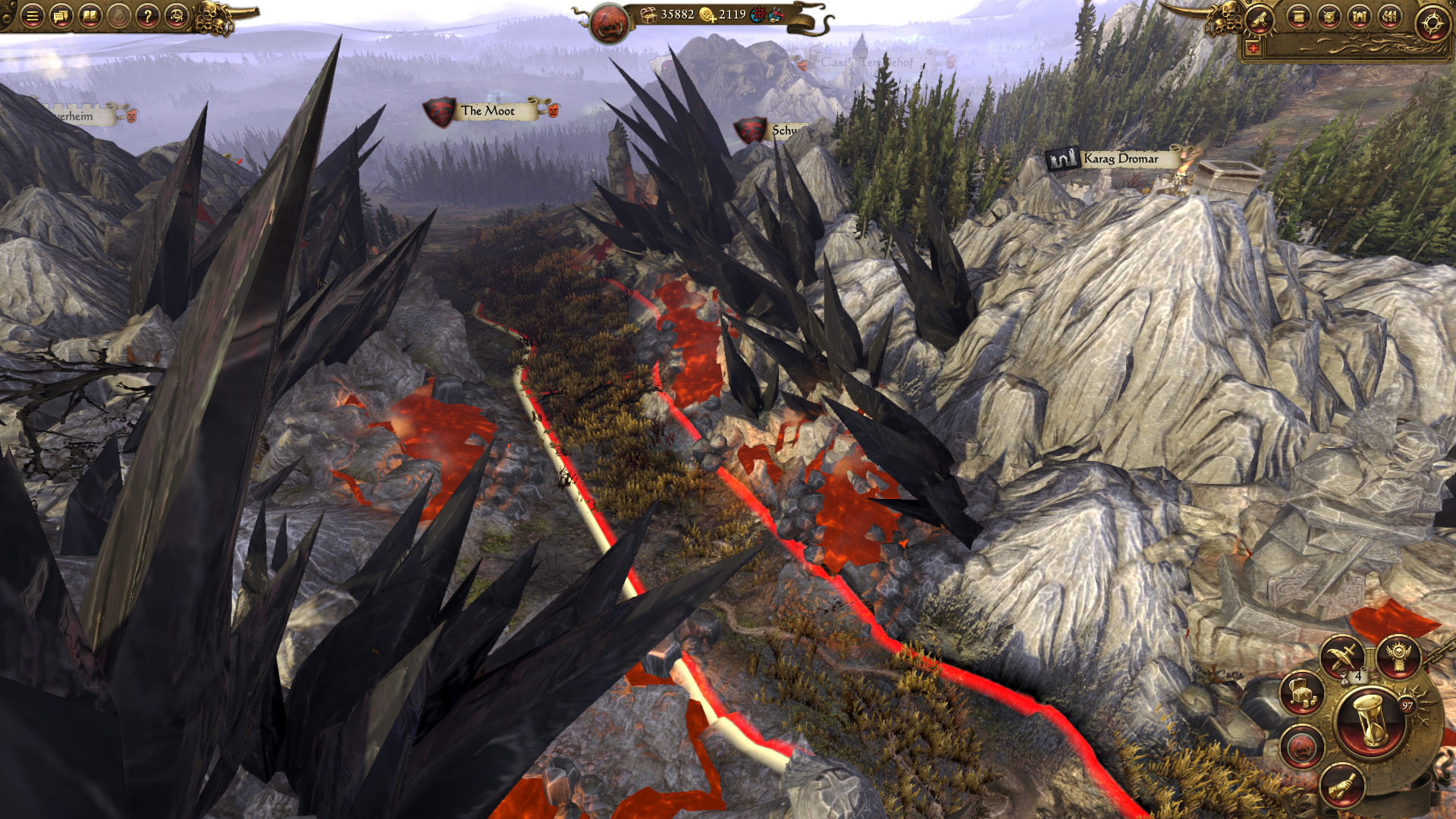
Heroes are both tough individuals who can embed within your armies and agents who can deploy across the campaign map to perform specific actions. That map’s impressive in its detail, looking like cartography from the inside cover of a book made real. Heroes assassinate and corrupt, damage walls and buildings, reduce income and public order, or improve those things within your own borders. Sadly there are no videos for Hero actions, none of those clips of a ninja or geisha doing something cool that the Shogun games had.
Nameless Heroes can die, but named characters are only ever injured and keep coming back. Sometimes this seems apt, and having to kill the Necromancer Heinrich Kemmler twice only to see him resurrect again was perfect. It's odder when Joe Random Minor Hero keeps coming back to annoy the same city even after I pay money and risk the odds to have him assassinated over and over.
It's not all about death. There are unique tech trees to research, buildings to construct, public order to maintain, and diplomacy to tinker with. Even the Greenskin tribes engage in limited diplomacy–though they don't make trade agreements they do negotiate alliances with each other and sometimes the Dwarfs tempt them with gold to buy peace. A lot of money gets thrown around on the diplomatic screen. It's easy to profit by letting one side of a war buy you off then waiting for the other to tempt you away, flip-flopping repeatedly with no noticeable impact on your standing. After a few Total Wars I've forgiven the weaknesses of the AI, but the talking heads on the diplomacy menu still feel daft.
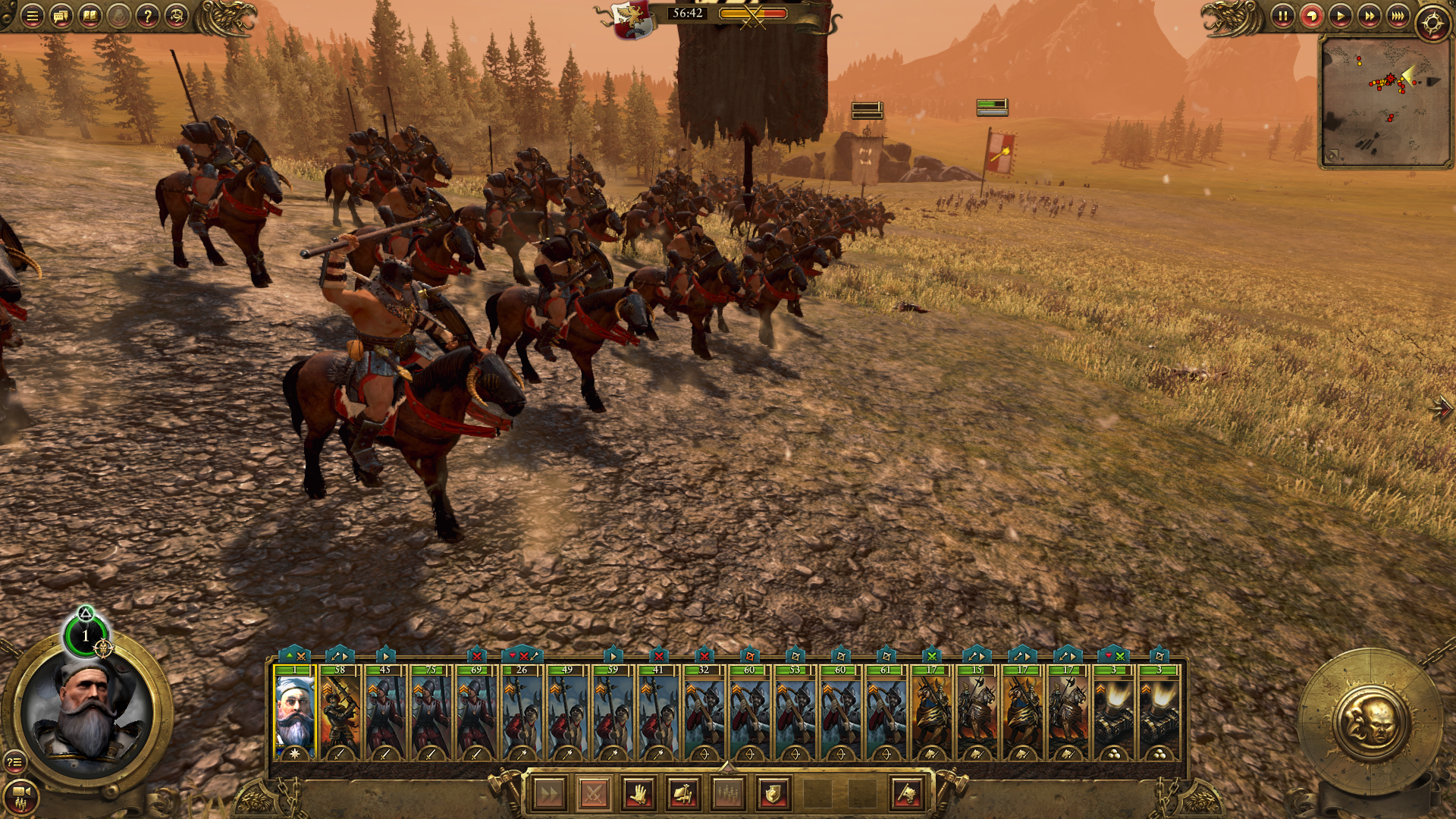
Tonal war
Sometimes the Total War game underneath pokes through, creating situations that don't feel right for Warhammer. When Dwarfs defeat Greenskins they have an option to ransom their captives for cash, a decision I can't see either side agreeing to in the fiction. But there are times when the tone is absolutely right, as when the Dwarfs are given a choice to forgive a grudge but both the replies available are different wordings of “hell no.”
One of the most Warhammer-ish things about it is Chaos. After 20 turns warnings appear: Chaos gathers in the north. It's another 50 turns before I notice their effects, a spreading corruption like the undead's. As the computer turns whiz past, the pause while the Chaos Warriors move grows longer and longer as their numbers grow. It's past turn 100 before I engage with them, but by then the northern Old World is ruins, and Archaon The Everchosen leads a doomstack right towards me.
The end times came and I ignored them, pretending it wasn't my problem until it was too late.
It feels strange to be worried about spoilers for a strategy game, but you should encounter Chaos for the first time for yourself. Games Workshop has told the story of this Chaos Incursion twice–the first time Chaos lost and fans hated it, the second time Chaos won and fans hated it. Now you can retell that story yourself. It's a story of nations squabbling when they should unite, but even as darkness draws closer the acrimony between me and my foes, combined with the desire to take their territory, stops me from committing to confederation. The end times came and I ignored them, pretending it wasn't my problem until it was too late.
The part of me that collected a High Elf army as a teenager wishes it was broader in scope (at least give us Skaven!) but there will be expansions to cover some of that and in previous games they’ve been handled well. Anyway, the best Total War games have been the most focused, whether on a single nation or a single general. Total War: Warhammer takes in a continent but tells one story, and it's potent because of that.
If you find real history a bit bland compared to glorious nonsense made up by strange British people then Warhammer is the Total War for you.

Jody's first computer was a Commodore 64, so he remembers having to use a code wheel to play Pool of Radiance. A former music journalist who interviewed everyone from Giorgio Moroder to Trent Reznor, Jody also co-hosted Australia's first radio show about videogames, Zed Games. He's written for Rock Paper Shotgun, The Big Issue, GamesRadar, Zam, Glixel, Five Out of Ten Magazine, and Playboy.com, whose cheques with the bunny logo made for fun conversations at the bank. Jody's first article for PC Gamer was about the audio of Alien Isolation, published in 2015, and since then he's written about why Silent Hill belongs on PC, why Recettear: An Item Shop's Tale is the best fantasy shopkeeper tycoon game, and how weird Lost Ark can get. Jody edited PC Gamer Indie from 2017 to 2018, and he eventually lived up to his promise to play every Warhammer videogame.
